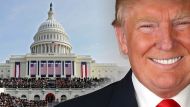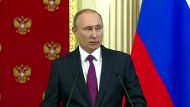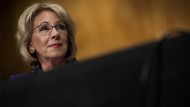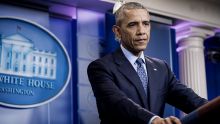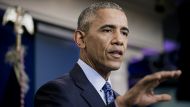Washington: When Donald Trump strides onto the inaugural ballroom floor this week amid the sprawling celebration of his swearing-in, he will have corporate America and many of its titans to thank for the rapturous greeting.
Chevron, the oil giant, has given $US500,000 ($663, 189) for the dayslong festivities. Boeing, which has been a target of Trump, pledged $US1 million ($1.3 million). And Sheldon and Miriam Adelson, giants of the gambling industry, are said to have donated more than that by themselves.
More World News Videos
What happens on Inauguration Day
Set your alarm early Saturday to watch the Donald Trump pledge the oath sworn by all 44 US presidents as part of three days of traditional ceremony.
They are far from alone.
All told, the group planning the inaugural festivities says it has raised more than $US100 million ($133 million), which would be nearly double the record for an inauguration, with much of it coming in six- and seven-figure cheques from America's corporate suites.

In exchange, Mr Trump's most prolific donors will gain access to what amounts to a parallel inauguration week, carefully planned and largely out of public sight, during which they can mingle with members of the incoming administration over intimate meals and witness Mr Trump's ascension from the front rows.
No matter which party controls the White House, corporations and wealthy individuals open their chequebooks every four years, and administrations reward their donors with private events and other incentives.
But ethics experts say Mr Trump's donors are being given greater access and facing fewer limits on donations than those in other recent inaugurations, despite his vow to "drain the swamp" of special interests in Washington.
"This is nothing short of selling access to the president, the vice president and the Cabinet," said Craig Holman, a registered lobbyist for Public Citizen, a nonpartisan ethics group in Washington. "This is very unfettered, brazen selling of access. It certainly runs counter to any presidential candidate who was talking about draining the swamp."

For those who have bankrolled the events, inauguration week will look quite a bit different from what it will to average Americans viewing it from home or the National Mall. The festivities will begin Tuesday evening with a black-tie "Chairman's Global Dinner" for Trump's Cabinet picks, congressional leaders, foreign diplomats and a few top donors.
On Wednesday, events include a lunchtime reception hosted by Reince Priebus, incoming White House chief of staff, and a dinner honouring Vice President-elect Mike Pence, according to a copy of the week's schedule obtained by The New York Times.
Thursday will feature another "leadership luncheon," a public concert at the Lincoln Memorial featuring artists like Toby Keith and 3 Doors Down, and a candlelight dinner with Mr Trump and his family for about 1,500 in the great hall of Union Station.
Packages range from $US25,000 to $US1 million or more for both individuals and corporations, and as the figures rise, so do the number of invitations available and the level of proximity to the president-elect and his inner circle.
Throughout the week, private transportation will ferry donors between a handful of high-end hotels, where donors were given priority booking, and the events. During unscheduled time, donors will be able to take advantage of private tours of Smithsonian museums arranged for them by the inaugural committee.
Depending on the size of their gift, donors are also entitled to several VIP tickets to an inaugural ball (there will be two, hosted on two floors of the convention centre), the inaugural parade and the swearing-in.
For the most important guests, including many of Mr Trump's Cabinet picks, his new hotel blocks from the White House will serve as a de facto home base and after-hours social venue, according to a member of the committee.
Unlike campaigns, inaugural committees face few regulations limiting what they can raise and how they can do it. That has traditionally left it up to each administration to set its own restrictions.
George W. Bush did not place restrictions on who could donate, but he did cap gifts at $US100,000 in 2001 and at $US250,000 in 2005.
Barack Obama went further in 2009, banning all gifts from lobbyists and corporations, and capping individual gifts at $US50,000, even as his fundraising team amassed $US53 million, then a record. He relaxed those restrictions in 2013, generally accepting corporate gifts up to $US1 million and individual gifts up to $US250,000.
Mr Trump's team said it would not accept gifts from registered federal lobbyists or solicit corporate donations over $US1 million. The committee did not cap contributions from individuals.
While Mr Obama and Mr Bush also offered tiered incentive packages, Mr Holman, of Public Citizen, said that the packages offered by Mr Trump's team appeared to promise greater access than those of the recent past.
The inaugural committee will not be required to disclose its donors until late April, 90 days after the inauguration.
The funds will cover all nonofficial inaugural programming, though the committee has not detailed exactly how much it plans to spend. A spokesman, Boris Epshteyn, has said any leftover money will be donated to charity.
Thomas Barrack Jr., the private equity investor leading the committee, said his group's work was made considerably easier by a large untapped pool of donors who for one reason or another did not support Mr Trump's campaign.
The fundraising haul also shows that corporate America is coming around to the reality that it will have to do business with Mr Trump, who has shown himself more than willing to single out individual companies for criticism. His inauguration offers them a first chance to show their support.
"A lot of the people who were not on board early on are now getting on," said Mel Sembler, a longtime Republican fundraiser who has helped solicit donations.
Among the donors will be UPS and JPMorgan Chase, which declined to directly sponsor the Republican National Convention last summer, despite past support. (The bank donated instead to summer youth employment programs in the host cities for both conventions.) Bank of America and Deloitte, donors to Obama's 2013 inauguration, will give again this year, too. And a spokesman for AT&T; said the company had made both a monetary contribution and agreed to spend millions of dollars to bolster cellular service for the crowds.
Daniel I. Weiner, who studies campaign finance issues at the Brennan Centre for Justice, said those gifts, while certainly not unusual, raised questions about Trump's campaign promises.
"Virtually any industry of any significance in the United States has business with the government, and the chance to rub shoulders with the president and prominent officials is kind of priceless," he said.
In a statement issued to The Times on the committee's fundraising work, Mr Epshteyn said the group was "honoured and humbled by the incredible outpouring of support" and focused on organising "world-class" events honouring the nation's history.
Several members of the committee rejected the criticism of its fundraising.
"Look, a lot of people are just good American citizens, and they want to support the transfer of power," said Ray Washburne, a Dallas investor and a member of the committee. "As far as buying influence, I don't know what kind of influence that can buy."
Mr Sembler agreed, but said it was certainly "good public relations" for US companies to be backing the celebration.
"It's important to have your name there if you are in that business," he said. "It's like supporting your community."
The New York Times

